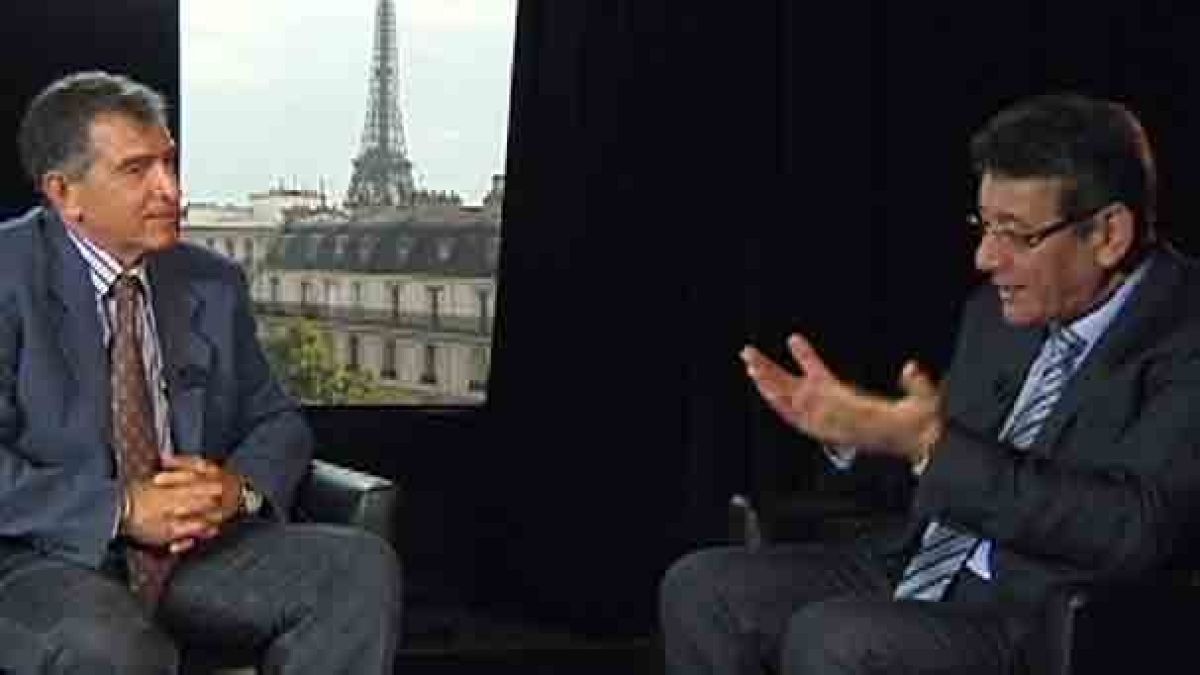Revolutions can be messy affairs, especially when there is a resort to arms, a regime turns in on itself, and civil war looms.
The Libyan revolution has been no exception, but it is a revolt that has been led by the people, elbowing aside the big political figures who for so long appeared to, at the best, passively go along with 42 years of dictatorial rule.
Today questions are being asked about some in the Libyan rebel leadership. Who are they, and do they have clean hands?
One of its leading spokesmen is a man who for years was as close to Muammar Gaddafi as any non-family member, Dr. Fathi Ben Shatwan.
euronews:
“You were industry minister for several years and then Muammar Gaddafi’s energy minister for two years until 2006. You quit the regime and fled in the most spectacular manner, on a small boat to Malta and from there to France. What led you to escape in this way?”
Dr. Fathi Ben Shatwan:
“When the revolution began on February 20th I went to Misrata, my home town, with my family. It joined the revolt and freed itself, but after 45 days there I and several others thought it would be better if I returned to Malta and served the revolution from the exterior. So you see, I didn’t flee, but some in the media claimed this and I didn’t want to contradict them…”
euronews:
“But today everyone wants to know why you, as well as Mustapha Abuljalil the justice minister, and interior minister Abdulfattah Younes became dissidents after the revolution and not before? Why not before? Why wait until the beast has rolled over before reaching for your knives?”
Ben Shatwan:
“In reality the Libyan regime was so tightly-controlled and security was so solid that no-one could do anything, even the opposition which tried for 30 or 40 years to change things in vain. So we were left with a choice, leave Libya and become refugees or try to work for our country within the regime.”
euronews:
“Today the people have taken to the streets to call for freedom, surprising the political class and taking the initiative from those who could have changed things. Why did the opposition run to NATO when the revolution was up and running and the people had decided to free themselves?”
Ben Shatwan:
“In fact the revolution began peacefully, as you know. But the regime quickly embarked on an unprecedentedly violent route, which surprised the whole world. This is why NATO and three nations, Britain, France and the United States intervened to save the Libyan people. Remember when the bombardment of Benghazi began. If that had continued 250,000 or 500,000 people would have died.”
euronews:
“There are some people who say that the opposition or Transitional Council asked French philosopher Bernard Henri-Levi to take a message to Tel Aviv offering to recognise Israel.”
Ben Shatwan:
“No, I don’t believe these rumours. I know the council members very well, especially Sheik Mustapha. He would never do this sort of thing.”
euronews:
“Do you think Henri-Levi did this off his own bat?”
Ben Shatwan:
“Yes, I think he wanted to take an initiative that wasn’t there. I’m not a member of the council but I think such a thing would be impossible, and cannot be true.”
euronews:
“Let’s talk about something else now of especial interest for the Libyans. We know that Libya is an oil exporting country, it’s a rich country. We also know that you were the energy minister. Where is Gaddafi’s money?”
Ben Shatwan:
“Look, to be frank with you, the truth is that Libya has known corruption these past 10 years when Saif Al Islam was in charge of all economic affairs, the Libyan economy was in his hands. Those who worked on the Popular General Committee took their orders directly from him.”
euronews:
“So Gaddafi senior is innocent of all that?”
Ben Shatwan:
“I don’t know the details, but through my responsibilities there my experience is that it is Saif Al-Islam who was in charge of transferring money and channelling funds abroad, that’s what I know.”
euronews:
“How much money was embezzled? Do you have a figure?”
Ben Shatwan:
“Frankly, people talk about it, they don’t give precise figures, but looking at oil production these last few years we reckon the sum of money embezzled varies between 200 and 250 billion dollars.”
euronews:
“BILLION dollars?”
Ben Shatwan:
“Yes”
euronews:
“That have been transferred out of Libya?”
Ben Shatwan:
“They’ve been transferred ostensibly as investments or in other forms.”
euronews:
“How do you see Libya’s immediate future now the end of Gaddafi is near?”
Ben Shatwan:
“I think the vice around him is tightening and he’s now encircled in a 50 kilometre circle around Tripoli. I think there are two options open to him. Either he continues to fight with resulting high casualties in people and property, or he agrees to leave Libya and Tripoli will be saved.
euronews:
“What is your vision for the Libya of tomorrow?”
Ben Shatwan:
“We need a road map. The Council needs a plan for the different stages of the revolution, from the liberation stage on the ground to the transition and beyond to the period of construction.”
euronews:
“But there’s one big question: what is NATO’s future in Libya?”
Ben Shatwan:
“We mustn’t forget NATO entered Libya with a UN mandate and resolution backing it. It has helped the Libyan people a lot, and without its help the number of martyrs would have been very high. I think in Libya’s road map to the future we must turn towards the Arab and NATO nations which have helped the Libyan people and saved hundreds of thousands of Libyan lives.”
euronews:
“Does Dr. Ben Shatwan expect to have some sort of job in the future government?”
Ben Shatwan:
“I have decided to retire from politics and write, learn, and help others.”


